
The Graduate Center, in the Office of the Provost, administers the year-long Pivot 314 program for mid-career PhD students to enhance their academic journeys through interdisciplinary connections and innovation, strengthening communication and research skills, and experiential learning. The program runs for one calendar year beginning in January and includes a hands-on, part-time, 10-week applied academic experience over the summer with a St. Louis-based organization. The application opens up in the fourth quarter each year for the following calendar year.
For 2025, Pivot 314 is expanding its disciplinary focus, to allow students to explore learning opportunities in the humanities, the environment, and innovation and entrepreneurship. Through partnerships with the Skandalaris Center for Interdisciplinary Innovation & Entrepreneurship, the Center for Humanities, and the Center for Environment, students will build/expand their network and find an applied academic experience for the summer that will further their research skill development while also making an impact on and connections in the St. Louis community.
Our Mission
To provide exceptional resources and support to PhD students applying academic and research skills in experiential learning opportunities outside and/or alongside of the academy while making valuable connections in the St. Louis community.




2025 Program Information
- Current WashU PhD students, regardless of discipline. Preference will be given to mid-career students who have completed at least two years of study towards a PhD and are currently in their third, fourth or fifth year (at the time the application is due).
- Students must be enrolled full time during the entire 2025 calendar year of the Fellowship (January-December) and located in St. Louis.
- Students must be interested in exploring learning opportunities in St. Louis that broaden their academic focus and be interested in partnering with organizations in the St. Louis community, especially in industries related to the humanities, the environment, and innovation and entrepreneurship.
- Students must remain in good academic standing according to their Academic Program Handbook throughout the Program.
- Students must have the approval of their PI/Academic Advisor.
- If not a U.S. citizen, the student needs to be on a visa appropriate for a student and which allows a paid curricular experience for the duration of the Program (F-1 and J-1 visas are eligible – please consult an OISS advisor more information).
- Academic development focused on improving communication, uplifting research skills, innovation, and interdisciplinary connections through workshops, field trips, and other engagement opportunities.
- Applied academic experience with a St. Louis-based organization while gaining a deeper appreciation of the local community.
- Freedom to explore the myriad ways that research skills developed through a PhD program can be used within and in conjunction with academia and beyond.
- Networking with the St. Louis community.
- Individual leadership coaching sessions.
- $4,000 stipend for summer applied academic experience, supplemental to any existing funding (e.g., fellowship stipend, wages) a student may already be receiving.
- Attend monthly sessions held in person.
- Complete 2-3 “impact assignments” related to the academic/research development and network-building process (i.e. coffee conversations, informational interviews, etc.).
- Attend 2-3 special events throughout the year (e.g., welcome reception), whether through The Graduate Center or one of the partner Centers.
- Maintain satisfactory academic standing in respective academic program according to the student’s Academic Program Handbook.
- Complete an in-person 10-week applied academic experience with a St. Louis organization between May-August .
- Submit all required deliverables via Canvas/LMS, including but not limited to: applied academic experience match details, milestone completion, and experiential learning reflection.
Participants are encouraged to attend partner Center programming throughout the year to broaden their network and increase their interdisciplinary connections, which can bring new perspectives and innovations to students’ academics.
The 2025 application is now closed. The 2026 application will open in the Fall of 2025.
Applicants should confer with their Principal Investigator (PI) and/or Academic Advisor prior to submitting an application.
A complete application should include the following information submitted through the application form (items 1-3):
- Cover letter that addresses your interest in the Pivot 314 Program and the following prompt: Tell us about your academic trajectory and what is driving your interest in exploring areas beyond those related to your specific discipline. How do you anticipate those experiences and the myriad skills and interdisciplinary connections developed through this Program will enhance your current academic work and trajectory?
- Unofficial transcript
- Confirmation of approval by your PI/advisor to participate in this program.
- One faculty letter of recommendation addressing how the opportunity will be valuable to the student, submitted via email. (Please have the recommender address the letter to the Pivot 314 Program Committee and submit directly to pivot314fellowship@wustl.edu before the application deadline.)
Q: What kind of programming does this program offer?
A: Programming is centered around interdisciplinary connections, communication, and St. Louis community impact. Highlights of 2024 programming include:
- Introduction to the St. Louis community
- Preparing for your summer applied academic experience
- Intimate events with university leaders
- Time management workshop
- Reflect & Reintegrate – enhancing your academic work by integrating your summer experiential learning
- Networking and summer experience search workshops
Q: What is the time commitment for the internship?
A: The summer internship is typically 10 hours per week for 10 weeks and occurs during the months of May – August based on an agreement between the host and the participant. This is to protect students’ existing lab/research commitments. Any time beyond 10 hours per week, or the number of hours specified by a student’s school policy as the permissible maximum, must be made in agreement between the student, internship host, PI/advisor, and school graduate program office.
Q: I am an international student, can I participate?
A: Yes, international students can participate. They must apply for and receive CPT for the paid summer applied academic experience. To ensure CPT approval, international students must select an applied academic experience that is aligned with their academic program/research. Consult your OISS advisor for more information.
Q: How does the internship stipend impact my other funding?
A: The summer stipend is meant to be supplementary to any other funding a participant may be receiving (e.g., stipend). Participants should talk with their PIs/Academic Advisors about summer research time prior to submitting a Pivot 314 application.
Q: When is the internship stipend disbursed?
A: The stipend is distributed evenly over the duration of the summer applied academic experience (May, June, July, August).
Q: Is the stipend taxable?
A: Taxes will be handled according to a participant’s citizenship or visa status. Please visit WashU’s Financial Services site for more information on the taxability of stipend payments. Participants should consult with a tax expert to understand all tax implications based on their situation.
Q: Will a participant receive course credit for the summer applied academic experience?
A: All participants are enrolled in a zero-credit course to document the summer experience. International students will note this class on their Curricular Practical Training Documentation (CPT).
Q: How does a participant secure an applied academic experience?
A: The partner Centers will assist with identifying relevant organizations interested in hosting PhD students. Participants, however, are ultimately responsible for searching, networking and securing their opportunity.
Q: Can I engage with a startup/company my PI is involved with (founder/co-founder/stakeholder)?
A: Generally, completing your summer experience with a PI/Advisor’s startup/company is to be avoided. A key focus of this program is facilitating exploration and expansion of the student’s current experience and community.
“The internship experience has been invaluable for learning about the biotechnology industry. I am certain this experience will be what I talk about most during future job interviews.”
Pivot 314 participant, 2021
Meet our Participants
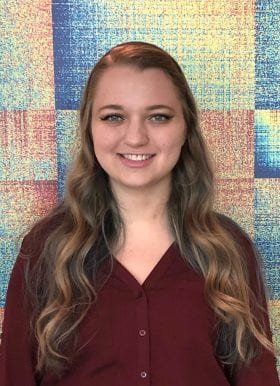
Stephanie Doering
PhD candidate in Neuroscience | Entering year: 2019 | Research interests: the spatial spread extent and spread patterns of tau protein neurofibrillary tangles in Alzheimer Disease.
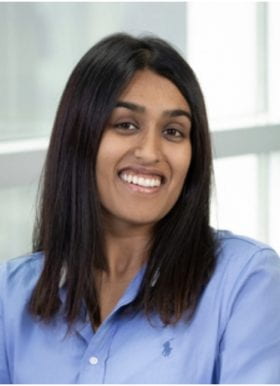
Rosie Dutt
PhD in Imaging Science | School Entering Year: 2019 | Research interests: big data, fMRI, depression, psychological events | Graduated: 2023.
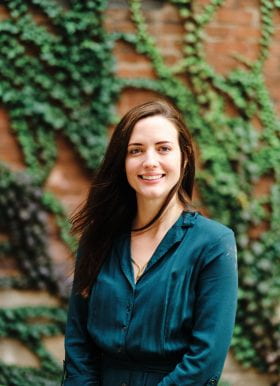
Laura Evers
PhD candidate in English Literature | Entering year: 2020 | Research interests: documentary poetics and film, race and gender studies, intermediality, and visual culture.
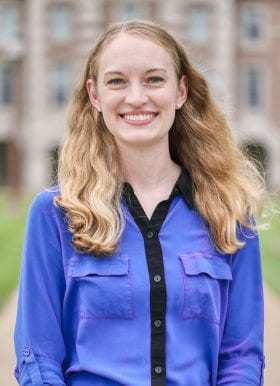
Laura Fischer
PhD candidate in Developmental Biology | Entering Year: 2018 | Research interests: human embryogenesis and regenerative medicine.
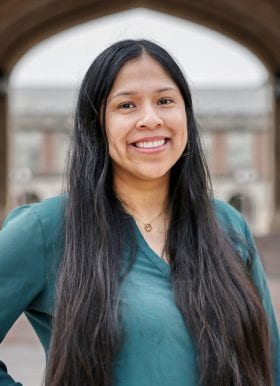
María Gandarilla Ocampo
PhD Candidate in Social Work | Entering year: 2018 | Research interests: child maltreatment epidemiology and child welfare policy.
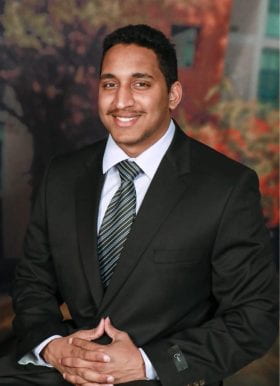
Rajeev Gopal
PhD candidate in Energy, Environmental & Chemical Engineering | Entering year: 2019 | Research Interests: critical electrochemical kinetics in solid-state electrolytes for energy storage systems.
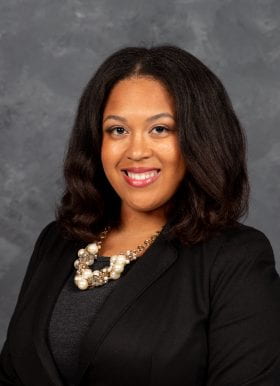
Dominique Horton
PhD candidate in Social Work | Entering year: 2019 | Research interests: African American families; Anti-racist pedagogy; Centering Black Educator Voices; Education and Social Inequality; K-12 Education Policy, Equity, and Outcomes; School Social Work; Social Work Education and Culturally Responsive Practice.
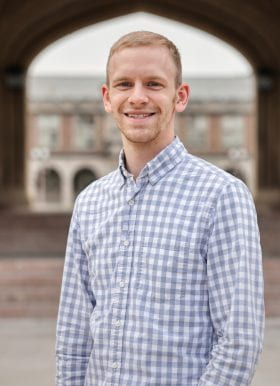
Nick Jensen
PhD in Computational & Systems Biology | Entering year: 2018 | Research interests: computer science intersections with biology | Graduated: 2023.
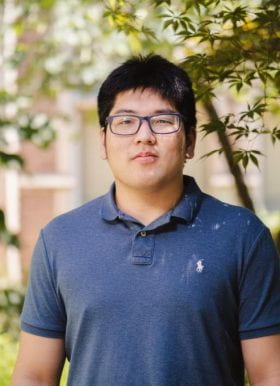
Kyusik Kim
PhD in Molecular Cell Biology | Entering year: 2017 | Research interests: investigating mechanisms of translational fidelity and translational reprogramming in response to stress in Eukaryotes | Graduated: 2023.
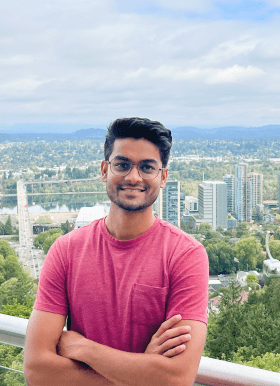
Joshin Kumar
PhD candidate in Energy, Environmental & Chemical Engineering | Entering year: 2020 | Research interests: Physics-Based Modeling with Emphasis on Atomic and Radiative Transfer Simulations, along with the Application of Data Analysis, Machine Learning, and Deep Learning Techniques in Health and Environmental Sciences.
Inquiries about compliance should be addressed to:
Vice Chancellor for Human Resources
Washington University in St. Louis
MSC 1190-853-03
One Brookings Drive
St. Louis, MO 63130
Specific information may be obtained from the departmental or administrative unit to which the student intends to apply.
Washington University encourages and gives full consideration to all applicants for admission, financial aid, and mentorship. The University does not discriminate in access to, or treatment of mentees in, its programs and activities on the basis of race, color, age, religion, sex, sexual orientation, gender identity or expression, national origin, veteran status, disability or genetic information.